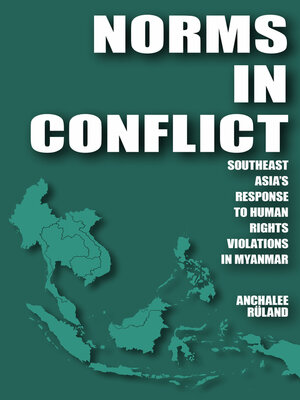Norms in Conflict
ebook ∣ Southeast Asia's Response to Human Rights Violations in Myanmar
By Anchalee Rüland

Sign up to save your library
With an OverDrive account, you can save your favorite libraries for at-a-glance information about availability. Find out more about OverDrive accounts.
Find this title in Libby, the library reading app by OverDrive.



Search for a digital library with this title
Title found at these libraries:
| Library Name | Distance |
|---|---|
| Loading... |
The people of Myanmar were struck by three major human rights disasters during the country's period of democratization from 2003 to 2012: the 2007 Saffron Revolution, the aftermath of Cyclone Nargis in 2008, and the 2012 Rakhine riots, which would evolve into the ongoing Rohingya crisis. These events saw Myanmar's government categorically labeled as an offender of human rights, and three powerful Southeast Asian member states—Indonesia, Thailand, and Malaysia—responded to the violations in very different ways. In each case, their responses to the crises were explicitly shaped by norm conflict, which may be understood as a tension between international and domestic norms. Their reactions were compelled by a need to address conflicting domestic and international expectations for norm compliance regarding human rights protection and non-interference in internal affairs.
In Norms in Conflict: Southeast Asia's Response to Human Rights Violations in Myanmar, Anchalee Rüland makes sense of state action that occurs when a governing body is faced with a circumstance that is at once in line with and contrary to its own governing policies. She defines five different types of response strategies to situations of norm conflict and examines the enabling factors that lead to each strategy. Domestic norms are known to evolve as a country's values change over time yet Rüland argues that the old and new norms may also coexist; knowledge of the underlying political context is crucial for those seeking a solid understanding of state behavior. Norms in Conflict challenges the conventional understanding of the logic of consequences in determining state behavior, advancing constructivist theory and establishing a provocative new conversation in international relations discourse.







